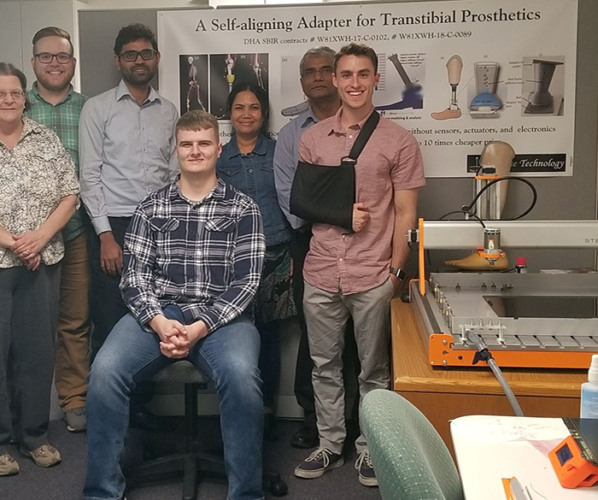Success Story
"The most natural and convenient location for our business was Innovation Park with all the facilities and business incubator support nearby"
Dr. Kamrun Nahar
Impulse Technologies Cofounder
Penn State Incubator Company Poised To Improve Prosthetic Mobility and Comfort for Amputees
Inspired by the potential that their research could impact real life applications, two Penn State researchers founded Impulse Technology, a Penn State Incubator tech-startup currently developing a below-knee prosthetic leg component to restore amputee mobility and improve the quality of their lives. The mechanism is designed to more closely mimic human movement, increase comfort, and reduce costs significantly from current options.
Impulse Technology was founded in 2013 by Dr. Aman Haque, a Mechanical Engineering Professor at Penn State University, and Dr. Kamrun Nahar, then a research faculty in the Engineering Science and Mechanics department at Penn State. The company specializes in the design, modeling, and fabrication of mechanical components and systems. The prosthetic leg component is the first product they are on the way to take to market.
“We founded Impulse with the goal of commercializing innovative ideas and products in high-impact mechanical and energy applications,” explained Dr. Nahar.
Since its founding, Impulse has sought opportunities to work with the technologies initially developed in the Penn State Mechanical Engineering department by Dr. Haque and his research group.
The founders came to the prosthetic leg component project when they learned the Defense Health Agency at the U.S. Department of Defense was seeking to create prosthetic legs to give users better mobility and comfort than what is currently available. The agency’s review panel found Impulse’s proposed solution of adding a component that allows a prosthetic leg to more closely mimic human movement, at a lower price, very compelling and so they were granted funding to develop it further.
“There are roughly 185,000 amputation-related hospital discharges in the United States each year, with an approximate hospital cost of $8.7 billion,” explained Dr. Nahar. “Our passive product will be approximately 10 times lower in price than current robotic prosthetics and is amenable to 3D printing.”
According to the Amputee Coalition, there are 1.6 million Americans with amputated limbs. The American Academy of Physical Medicine and Rehabilitation says 65% of those amputees in the US underwent lower limb amputation.
People with below-knee amputations often struggle with prosthetics that don’t fit properly or don’t leave them with a natural gait. Over time, this can lead to additional pressure on their other limbs and joints, back problems, pain, and limited mobility. The more closely a prosthetic leg can mimic human movement, the better it will be for the person wearing it.
“The good thing in doing the prosthetic leg component project is the feeling that we are working on something that makes a direct impact on people’s mobility and improves the quality of their lives,” said Dr. Nahar.
The prosthetic leg component uses Impulse’s core expertise in the design, modeling, and fabrication of mechanical systems. They are developing the prosthetic leg component technology, which received funding through Small Business Innovation Research Phase I and Phase II federal programs.
Knowing that they could not start a business without a lot of help, Impulse’s founders sought guidance and support at every step of their entrepreneurial journey. Dr. Nahar and Dr. Haque graduated from the Ben Franklin Technology Partners (BFTP) TechCelerator program in June 2013. BFTP guided them in the initial business setup, funded their initial projects and Impulse has been a portfolio company of BFTP since 2014.
The founders also worked closely with The Office of Technology Management (OTM) at Penn State. Impulse initially licensed through the OTM a Penn State technology for commercialization. Through the licensing agreement in 2015, Penn State became an equity partner of Impulse Technology. Impulse secured a Small Business Technology Transfer (STTR) Phase I grant from the National Science Foundation and Penn State was a research subcontractor on that project. Penn State was also a research subcontractor for the SBIR Phase I project on the prosthetic technology.
Today, Impulse has offices in the Tech Center in Innovation Park as part of the Penn State Incubator program. Being in the incubator gives Impulse easy access to the University, the OTM and BFTP — all organizations that have helped them along the way.
“The most natural and convenient location for our business was Innovation Park with all the facilities and business incubator support nearby,” said Dr. Nahar.
As Impulse has grown, they’ve continued to leverage the Invent Penn State entrepreneurial ecosystem. They participated in the Invent Penn State Venture and IP Conference in 2016, what Dr. Nahar says was their first introduction into the venture capital world. There they learned first-hand the importance of pitch preparation and presentation from a group of successful Penn State alumni executives and business founders.
Impulse team also participated in the Startup Leadership Network (SLN) in October 2018. Jim Pietropaolo, associate director of the Office of Entrepreneurship and Commercialization, guided them in their SLN participation and continues to do so.
“We made a presentation that resulted in a lot of useful feedback during the presentation session from the audience on both technology and business aspects,” said Dr. Nahar. “We followed up with a number of business experts who came to the SLN conference with interests in getting involved with startup companies. We later appointed one of them as a regulatory consultant.”
When asked what her advice would be to other entrepreneurs, Dr. Nahar says the road to success may not always be a straight one.
“There are many challenges in going through the processes of starting up a company with innovative ideas and taking it to the market,” she said. “The most important thing is to never give up when things do not work out the way you imagined and to take different turns if needed.”
Impulse is currently developing prototypes of the below-knee prosthetic leg component and plans to launch the product in 2020. Until then, they will test the product with amputee patients, develop manufacturing and infrastructure, and work to collaborate with more corporate partners and investors. They’ve already been working with partners like the Penn State and Ability P&O—a prosthetic company headquartered in Exton, PA.
For more information about Impulse, visit http://www.impulse-technology.com.






